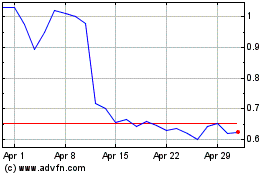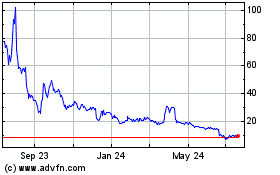By Mike Colias and Ben Foldy
General Motors Co. will no longer take an equity stake in
electric-truck maker Nikola Corp. under a stripped-down agreement
revealed Monday, a significant retrenchment from an earlier pact
that fueled investor enthusiasm for both companies.
Under the revised deal, GM still intends to provide Nikola with
fuel-cell technology but it has nixed plans to take an 11% stake in
the Phoenix-based startup in exchange for supplying engineering
work and other services.
The Detroit auto maker has also scrapped plans to build an
electric pickup truck called the Badger for Nikola, a key part of
an earlier agreement outlined in September. That deal got delayed
after a negative short seller's report raised questions about the
readiness of some aspects of Nikola's business, allegations the
company said were false and misleading.
The original agreement bolstered Nikola's status as one of
several highflying green-vehicle startups drawing attention from
Wall Street. GM lending its engineering and manufacturing
expertise, and being granted a spot on Nikola's board, had been
seen as a validation of Nikola's business model and growth
prospects.
For GM, the Badger piece of the deal had been seen as a boost
for its broader plans to license its electric-vehicle technology,
the potential of which has helped lift its share price in recent
weeks.
GM was to engineer and build the light-duty pickup truck for
Nikola, using its proprietary battery system that will be used in
many planned GM models.
Nikola shares were down about 24% in Monday morning trading
after releasing details about the nonbinding memorandum of
understanding with GM. GM shares were off about 1.6%.
The scaled-back deal with GM could be a blow to Nikola, whose
strategy involves striking alliances with other deep-pocketed
companies to collaborate on various parts of its business.
Emmanuel Rosner, an analyst at Deutsche Bank, wrote in a note
Monday that Nikola's outlook is highly dependent on whether it can
solidify cooperation on key technologies. "The lack of clarity on
these partnerships continues to keep us on the sidelines of Nikola
stock," he said.
Nikola revealed the revised deal with GM a day ahead of a
closely watched lockup period expiring for some early investors who
got shares as part of the startup's June listing. Starting Tuesday,
those investors can start selling off approximately 161 million
shares -- the majority of which are owned by founder and recently
departed Executive Chairman Trevor Milton.
A spokesman for Mr. Milton didn't have an immediate comment.
Executives and board members recently extended the lockup for
another 136.5 million shares through April, company filings
show.
While Nikola has yet to sell a single vehicle, its plans to
revolutionize the trucking industry with electric and fuel-cell
technology have excited Wall Street investors, causing its stock to
soar this summer.
In June, Nikola's market value briefly surpassed that of Ford
Motor Co., after Mr. Milton tweeted that the company would begin
taking reservations on the Badger pickup and show off a working
truck by the end of 2020.
Nikola had committed to pay GM up to $700 million to develop and
build the Badger in a deal valued at about $4 billion when it was
announced Sept. 3, including the equity stake.
Nikola's shares jumped on the news of the GM partnership, but
were slammed days later in the wake of the report from short seller
Hindenburg Research, which claimed that Mr. Milton made exaggerated
claims about Nikola's technology. Mr. Milton, who said he would
defend himself against the report's allegations, stepped down in
September.
Nikola faces continuing legal issues stemming from the short
seller's report. It disclosed earlier this month that it had
received subpoenas from the Securities and Exchange Commission and
U.S. Justice Department in September.
Nikola has said it was cooperating with the investigations. A
spokesman for the Justice Department declined to comment.
The fallout from the short seller's report also forced GM
executives to field questions about whether they had done their
homework on Nikola ahead of the deal. GM Chief Executive Mary Barra
has said that GM conducted proper due diligence and that the
companies had been introduced by Nikola Chairman Steve Girsky, a
former GM executive.
Nikola executives have said that the Badger was backed mainly by
Mr. Milton and have been seeking to refocus the business on its
commercial truck and hydrogen business since Mr. Milton's
departure.
"Heavy trucks remain our core business and we are 100% focused
on hitting our development milestones to bring clean hydrogen and
battery-electric commercial trucks to market," Nikola CEO Mark
Russell said.
The companies on Monday also said they will explore the use of
GM's electric-vehicle battery technology, called Ultium, in future
commercial trucks.
If the agreement outlined Monday comes to fruition, it would
mark the first commercial use of GM's hydrogen fuel cells, a
technology it began developing in the 1960s.
GM said Nikola would pay upfront for the capital investment
needed to engineer and build the fuel cells at a GM facility in
suburban Detroit.
"Providing our Hydrotec fuel cell systems to the heavy-duty
class of commercial vehicles is an important part of our growth
strategy," GM product-development chief, Doug Parks, said.
The technology uses on-board fuel cells to mix hydrogen and
oxygen to produce electricity, which drives the vehicle's electric
motors, emitting only water vapor. Several major auto makers have
accelerated efforts to develop hydrogen fuel cells for large
commercial trucks, maintaining they have advantages over batteries
for some uses.
RBC Capital analyst Joseph Spak said Monday that removing the
Badger pickup truck made sense for Nikola because it will keep the
focus on its core fuel-cell business plan. The startup also would
avoid diluting its shares by granting GM the planned 11% stake, he
said.
For GM, the new agreement is a solid resolution because it gives
the auto maker a potential fuel-cell customer that will fund the
capital investment needed to build the cells, Mr. Spak said.
Nikola's core business aims to build and lease hydrogen and
battery-powered heavy trucks to commercial customers such as
Anheuser-Busch InBev SA who are looking to cut down on the tailpipe
emissions of their logistics fleets. Nikola plans to provide not
only the trucks, but also the refueling stations and hydrogen fuel
necessary to power them.
The company has teamed up with other more established and
well-capitalized companies to collaborate on core parts of the
business. German auto supply giant Robert Bosch GmbH and European
heavy truck maker CNH Industrial NV hold equity stakes and board
seats, while providing technology for Nikola trucks.
The now-diminished deal with GM is the second potential alliance
disrupted since the publication of the short seller's report.
Nikola had also been in talks with companies including oil company
BP PLC to jointly build hydrogen fuel stations, but those talks
also stalled in September, The Wall Street Journal has
reported.
Nikola executives have said talks with potential partners on
hydrogen stations are ongoing and the company hopes to announce a
deal by the end of the year.
Write to Mike Colias at Mike.Colias@wsj.com and Ben Foldy at
Ben.Foldy@wsj.com
(END) Dow Jones Newswires
November 30, 2020 11:40 ET (16:40 GMT)
Copyright (c) 2020 Dow Jones & Company, Inc.
Nikola (NASDAQ:NKLA)
Historical Stock Chart
From Mar 2024 to Apr 2024

Nikola (NASDAQ:NKLA)
Historical Stock Chart
From Apr 2023 to Apr 2024
